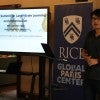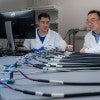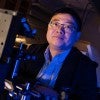
Rice algorithms take on quantum adversary
Rice computer scientists have developed algorithms that account for quantum noise that is not just random, but malicious interference from an adversary.

Rice algorithms take on quantum adversary
Rice computer scientists have developed algorithms that account for quantum noise that is not just random, but malicious interference from an adversary.

Rice researchers turn wasted data center heat into clean power
A new study from Rice shows how to turn data center waste into power.

Rice research team on quest to engineer computing systems from living cells
A Rice research team is on quest to engineer computing systems from living cells.

Wireless implant network could transform cardiac, neurological care
Researchers at Rice and collaborators have developed a wireless network of miniature bioelectric implants that could transform treatment for heart failure, spinal cord injury and other chronic conditions. The system would integrate with patient anatomy easier than conventional medical implants, eliminating the need for batteries and invasive wiring.

AI can help communities prepare for, respond to climate risks during peak hurricane season
As the Gulf Coast heads into the most active stretch of the Atlantic hurricane season — August through September — forecasters warn the region could face heightened storm activity this year, fueled by warm ocean waters and a changing climate.

Ripples of the future: Rice researchers unlock powerful form of quantum interference
Rice researchers have demonstrated a form of quantum interference two orders of magnitude greater than any previously reported.

Kavraki elected to European Academy of Sciences
Lydia Kavraki has been elected to the European Academy of Sciences.

No hype, just breakthroughs: Rice AI summit quietly makes waves in Paris
Some of the world’s top minds in machine learning, optimization and distributed systems gathered this summer in the heart of Paris.

Artificial intelligence is infamous for its resource-heavy training, but a new study may have found a solution in a novel communications system that markedly improves the way large language models train.

Rice experts are available to comment on digital health topics, including AI, wearable and ingestible devices, imaging and robotics.

Why some genes are more error-prone: Scientists uncover hidden rule in DNA transcription
The study by Rice scientists shows why genetic sequences are not equally prone to errors.

Thick electrodes’ chemistry matters more than structure for battery performance
Rice researchers showed that even if the materials used in thick battery electrodes have nearly identical structures, their internal chemistry impacts energy flow and performance differently.

NSF CAREER Award funds Rice project to shrink hospital-grade imaging into wearable devices
Rice’s Lei Li wins NSF CAREER Award to develop a new generation of wearable medical imaging technology capable of visualizing deep tissue function in real time.

Rice researchers search for ultralight dark matter using a magnetically levitated particle
A new study led by Rice's Christopher Tunnell and Dorian Amaral sees the first direct search for ultralight dark matter using a magnetically levitated particle.

In an elegant fusion of art and science, researchers at Rice have achieved a major milestone in nanomaterials engineering by uncovering how boron nitride nanotubes (BNNTs) — touted for their strength, thermal stability and insulating properties — can be coaxed into forming ordered liquid crystalline phases in water.